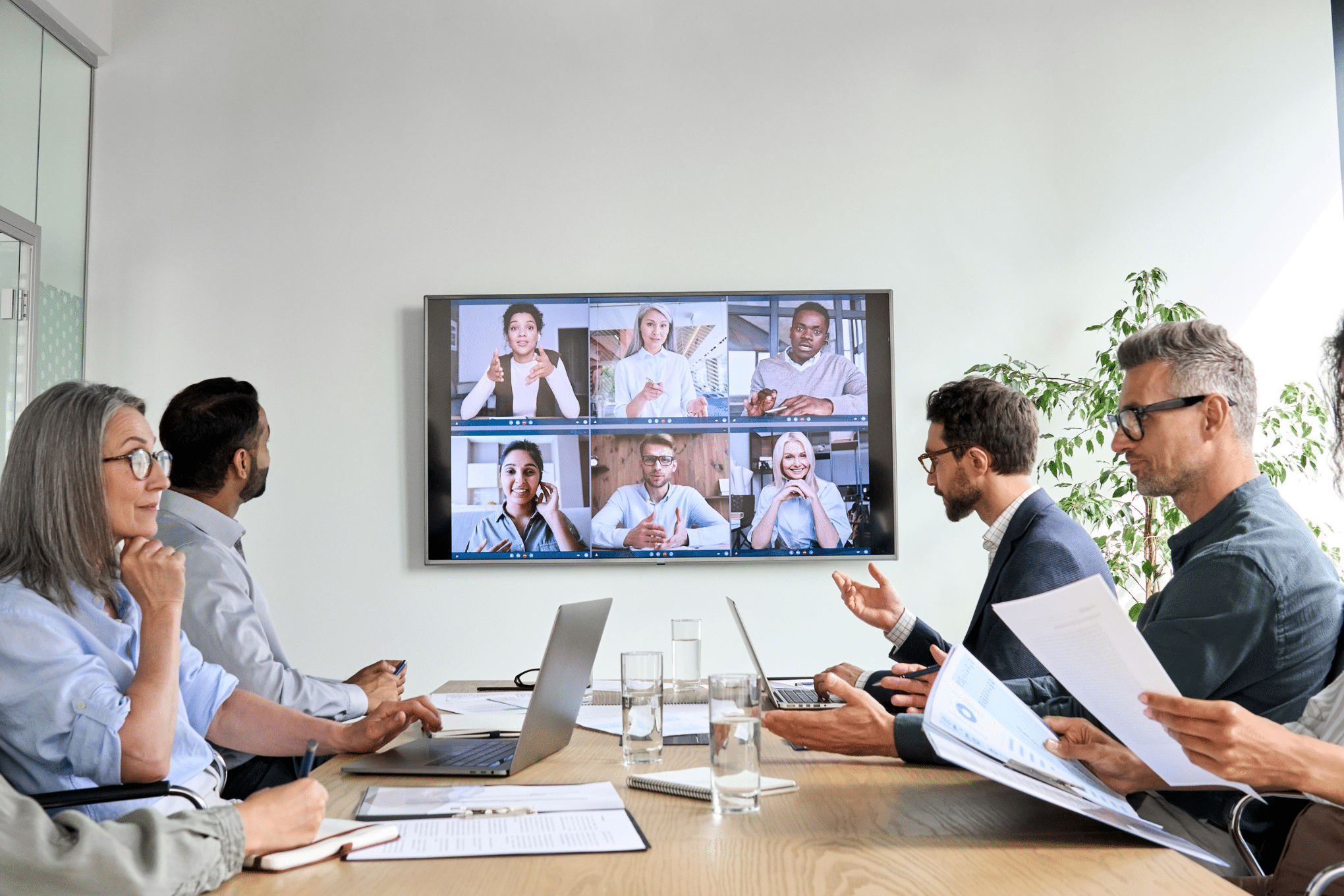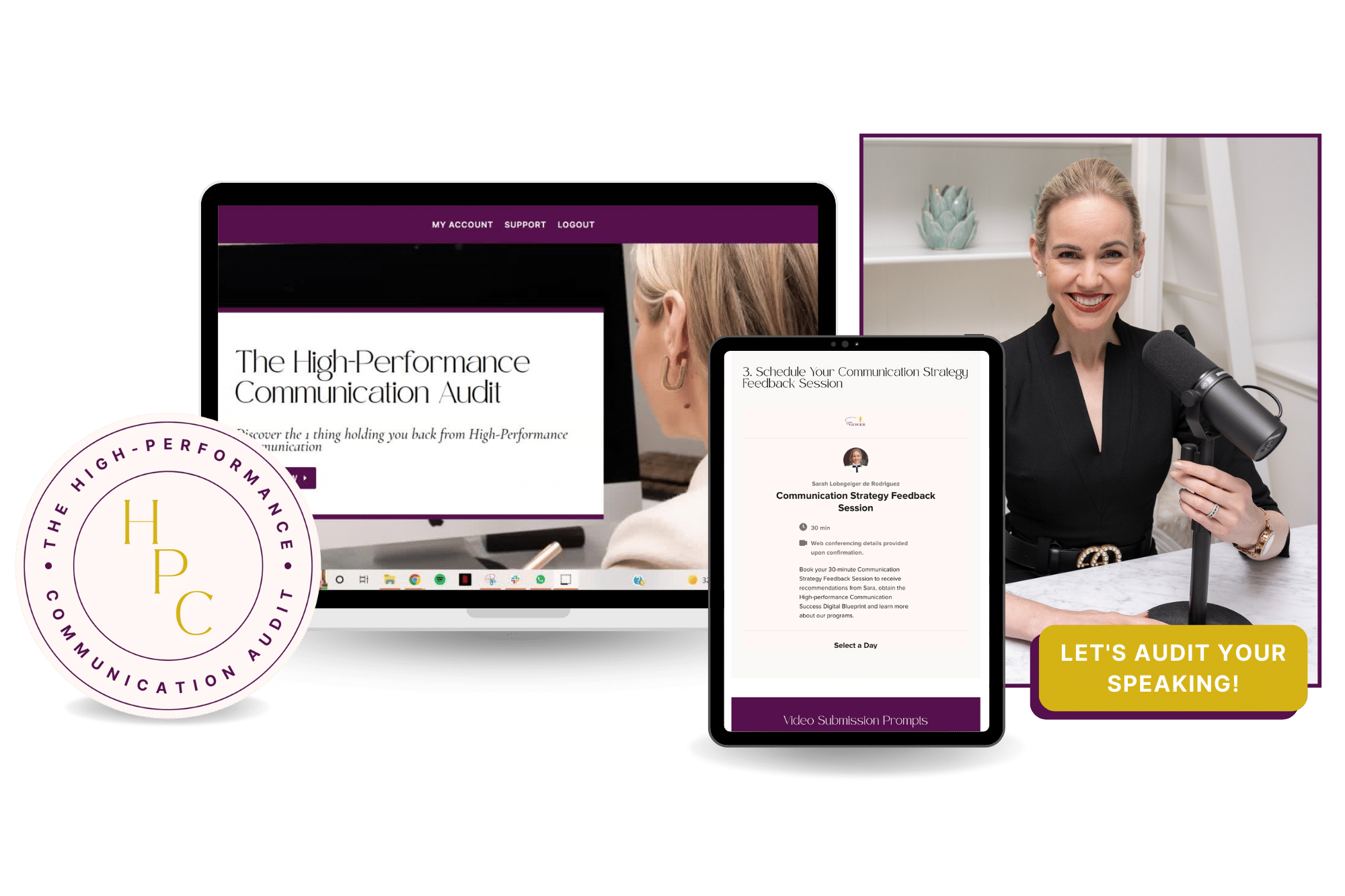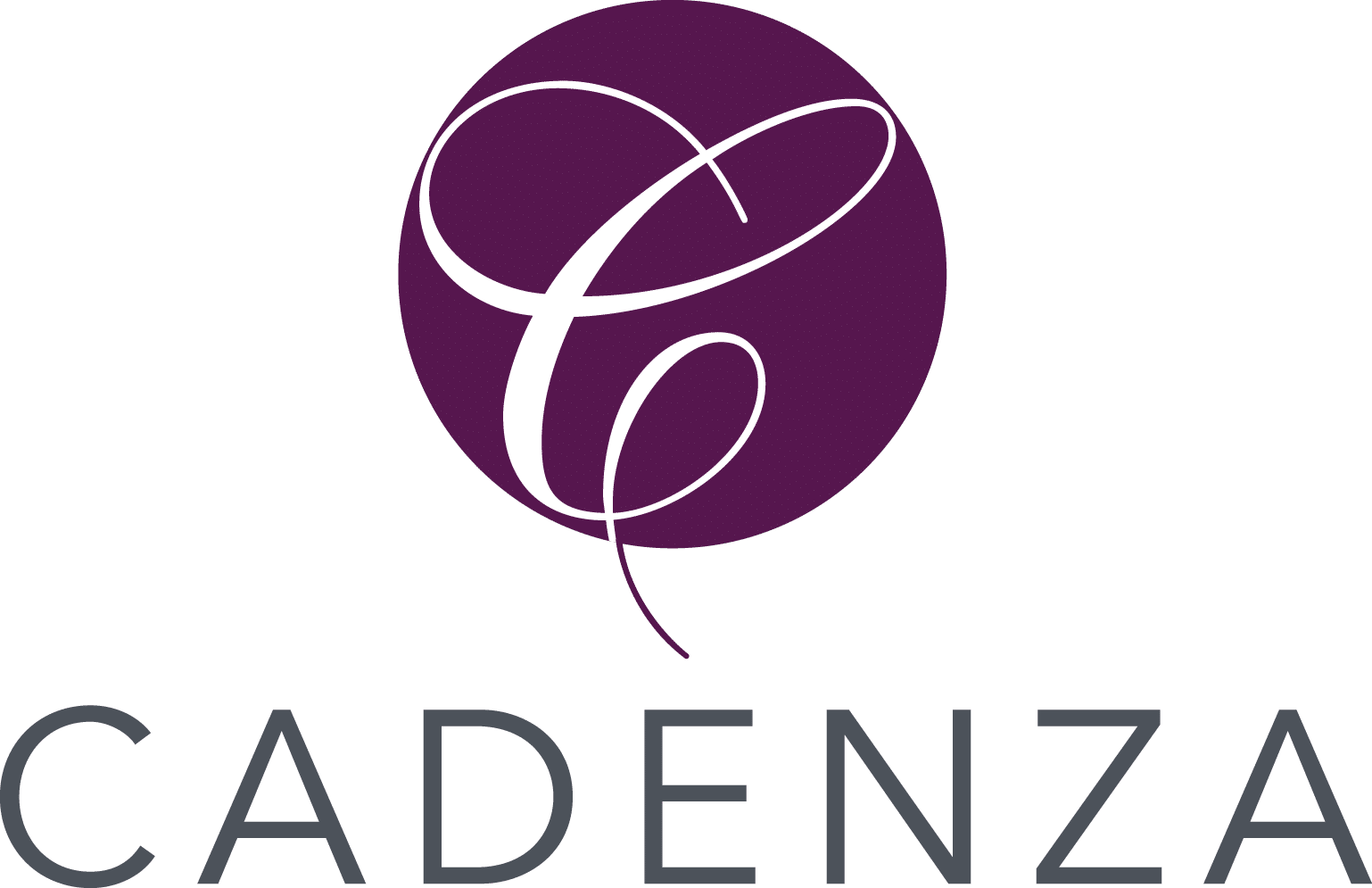Career Communication
How Strategic Communication Can Give You Unwavering Confidence in Meetings
Activate a 3-stage plan for strategic communication so you can speak confidently in meetings.

Today I’ll cover how strategic communication can give you unwavering confidence in meetings.
What will it do for your career if you can gain the confidence to present your ideas in meetings?
The ability to have confidence in yourself and what your saying is priceless.
In my work as an executive communication consultant, I’ve met hundreds of people who feel downright stuck about how to present their ideas effectively in team meetings.
However, there are many benefits for your career if you can learn to speak confidently in meetings such as increased leadership opportunities, less performance anxiety at work and more.
I’m going to share a 3-stage plan for building up your skills to achieve clear and direct communication in meetings.
Speak Confidently in Meetings
This blog is best digested in 3 steps.
You might want to bookmark this page to refer back to later – because it could take more than one sitting!
Stage #1 – Assess your Speaking in Meetings
Let’s take stock of how you come across in meetings.
If you know what will torpedo you the most in meetings, you’ve already taken the first step to finding solutions to increase your confidence in meetings.
Here are five questions to ask concerning your speaking.
You can remember the core areas to be mindful of with the mnemic – PIRPIS
Participation
Is my participation level appropriate in meetings?
Ideas
Can I present my insights, viewpoints and ideas clearly and logically and in a timely manner so the meeting runs efficiently?
Relationships
Do I strengthen interpersonal relationships and rapport effectively in meetings?
Presentation
Do I use my present confidently in the room while sharing my expertise and insights?
Influence
Do I hold any sway in team meetings?
Skills
What skills do I need the most to improve my communication in the next meeting?
Stage #2 – Prime
One of the most effective ways to gain unwavering confidence in meetings is to prime yourself ready for the meeting room.
Priming has helped hundreds of my clients worldwide with their shyness and presentation effectiveness in meetings.
When you prime yourself for a meeting, you’ll enter the exchange with the feeling that you’re better prepared, which tends to bring your speaking behaviour more into your control.
Use this strategic communication grid to prime yourself for your next meeting.
Who will be present?
Knowing who will be in the room can help you prime your involvement in the meeting.
Certain team members can impact how confidently we participate, share our ideas, feel connected, present, and hold influence.
Consider how the attendees will impact your Participation, Ideas, Relationships, Presentation, and Influence during the meeting. Preparation is key if you want to speak confidently in meetings.
Participation
What’s your appropriate participation level in this meeting according to your rank and role?
Ideas
Which insights, ideas, or viewpoints do you need to prepare so they come across clearly for this meeting? How can I be more precise and concise?
Relationships
Are there any key players you can build rapport with in this meeting? Are there any interpersonal risks to watch out for?
Presentation
Will your voice and delivery work effectively when sharing your ideas with these meeting participants?
Influence
Are there any risks to your reputation management, given who is attending the meeting?
Skills
What communication skills can you use that may best suit this meeting given the people present? Do you need to take care to protect your turn, to prevent people interrupting you? Should you watch out for your speech intonation to make sure that your boundary setting is clear and assertive? Do you need to apply strategies to boost team engagement in the meeting? All of these behaviours can be specifically primed before the meeting if you take time to consider what skills will get the best outcomes and collaboration with the people present.
What are the objectives of the meeting?
Consider what kind of meeting it will be (e.g. board meeting, AGM, KPI meeting, Cross-disciplinary project meeting, stand-up meeting). Forecasting the objectives for the meeting can assist you in streamlining the best communication approach for the meeting.
Participation
If you consider your KPIs, you can determine your most appropriate participation level in this meeting. Is there anything you need to prepare to allow you to participate more appropriately in the meeting?
Ideas
Which insights do you have that align with the meeting’s objectives, and how can you best showcase them? What questions can you ask to have a practical impact on the goals in the meeting?
Relationships
What relationships in the meeting room will make your involvement easier/ more difficult? How can you create positive collaborations in this meeting?
Presentation
What delivery style works best for this meeting type? If you could give three adjectives to the best delivery style for this meeting, what would they be? E.g. Calm, Positive, Inquiring / Assertive, Warm, Receptive
Influence
Are there any areas you need to exert influence that complement the meeting objectives?
Skills
What communication skills can you showcase to benefit the meeting- active listening, diplomatic gestures, advocacy for colleagues, a persuasive message delivery?
Stage #3 – Reflect
Balanced reflection is a strategic communication approach to building your confidence in meetings. When you’re face-to-face in the meeting room, the pressure of speaking on the spot can skew how you feel about your communication. A few moments of awkwardness, mumbling, or even difficulties finding the right words in time for a response and ordering your thoughts can make it seem like you did a lousy job.
Once the meeting is over, however, I want you to return to the PIRPIS strategic communication framework and evaluate how you went across those core areas because chances are you’ve done better than you realise.
Appraise how successful your communication was in the meeting with the PIRPIS strategic framework.
Participation
How was your participation level in this meeting according to your rank and role?
Ideas
Did your insights, ideas, or viewpoints come across clearly in the meeting? Did you share information that aligned with the meeting’s objectives. Did you stick to the time limits of the meeting?
Relationships
Who did you build rapport with in this meeting? Did any interpersonal risks arise?
Presentation
Did your voice and delivery work effectively when sharing your ideas in the meeting?
Influence
How did you build your reputation in this meeting?
Skills
What communication skills did you aim to use tactically in the meeting? Were you successful? Are there any skills you can add to improve your interaction style for future meetings?
When we feel less confident in meetings, we tend to focus on specific speaking behaviours like mumbling or feeling tongue-tied. Still, it’s more productive for our career communication to consider instead impact goals related to your participation, how you share your ideas, build relationships, and present and hold influence.
Did you identify any areas that need improvement ready for your next meeting?
What tools can you use for your next meeting to amplify your participation, idea sharing, relationship building, presentation and influence? Taking this strategic communication approach will build your speaking confidence in meetings.

Confident speaking tends to break down when we don’t have the tools to participate, share ideas, build relationships, use our voice correctly and cut influence successfully.
Mumbling, croaky voice, tangents, word-finding issues, and increased speaking anxiety are symptoms of something much bigger breaking down.
Stop rushes of speech, breakdowns in our message, and croaky, reluctant voice tone and replace them with elegant and eloquent statements that make your colleagues not only pay attention to what you have to say but find your message convincing and valuable in meetings. Learn the concrete- science-backed behaviours you need to sound confident, persuasive, and comfortable when speaking.
Start by setting concrete interpersonal communication goals to build your social connection skills – this focus will help you. to speak confidently in meetings.
My High-Performance Communication Audit gets you started~.
You can commence the process quickly by purchasing & submitting your audit tasks via an ingenious virtual assessment.
Once that’s done, you’ll schedule a strategy feedback session with me to gain precise science-based insights into practical areas of your communication that you can optimise.
✳️ Enrol & get started today.
Best,
✨ Does Your Leadership Communication need Work?
Like all professional skills, high-performance communication can be learnt, especially when it comes to leadership communication.
Meet our High-Performance Communication Audit!

So who is this audit best for?
- Anyone preparing for a high-performance communication activity where the stakes are high like job interviews, public speaking events, or managing teams.
- You if you want to secure your leadership presence in a way that amplifies team motivation, engagement and retention.
- CEOs, executives and emerging leaders who want to finally dedicate increased precision to their communication style to benefit their organisation and team.
If you’d like to get a comprehensive science-based assessment of your professional speaking and gain elite career communication tools, consider enrolling in my High-Performance Communication audit to uncover the turn-key your speaking needs.
Did you enjoy this post? Make sure to subscribe to our YouTube channel to get more content to increase your communication skills!
About the Author
Dr Sarah Lobegeiger de Rodriguez is a Keynote Speaker, Executive Speaking Coach, and Opera Singer who likes to play with words, sounds, and your impact.
Her academic background is in Music Performance, Communication Science and Speech & Language Pathology. She assists executive communication clients all over the world as a communication consultant with strong expertise in CEO, Founder and Entrepreneur communication strategies.
Connect with Sarah on LinkedIn.
© CADENZA
Level 14, 380 St Kilda Road, Melbourne, 3004
Privacy Policy
Terms & Conditions
Position Statement on Racism
